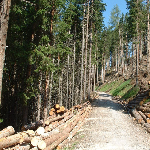
Supplementing forest sustainability certificates with fiscal instruments by Fiscal Forestry
Please find below the
Finalist Evaluation
Judges'' ratings
| • | Novelty: | |
| • | Feasibility: | |
| • | Impact: | |
| • | Presentation: |
Judges'' comments
SUBJECT: Your proposal has been selected as a Finalist!
Congratulations! Your proposal, Supplementing Forest Sustainability Certificates with Fiscal Instruments, in the Land Use Contest, has been selected to advance to the Finalists round.
Be proud of your accomplishment – more than 350 proposals were submitted and only a very small number have been advanced through these two rounds of judging.
As a Finalist, your proposal is eligible for the contest’s Judges Choice award, as well as the contest’s Popular Choice award, which is determined by public voting.
If you haven’t already, you will soon receive an email from the Climate CoLab staff with details about the voting period. If you don’t receive that email within the next day, or have other questions, please contact the Climate CoLab staff at admin@climatecolab.org
All winners will be announced the week after the voting period ends, on September 12, 2015 at midnight Eastern Time.
Both Judges Choice and Popular Choice will receive a special invitation to attend selected sessions at MIT’s SOLVE conference and present their proposals before key constituents in a workshop the next day, where a $10,000 Grand Prize will be awarded. A few select Climate CoLab winners will join distinguished SOLVE attendees in a highly collaborative problem-solving session. Some contests have additional prizes given by the contest sponsor.
Thank you for your work on this very important issue. We’re proud of your proposal, and we hope that you are too. Again, congratulations!
2015 Climate CoLab Judges
Here is a summary of the Judges' comments:
• Not really sure how this one could be feasible, but great idea
• Complex area and difficult approach
• Well thought-out, but lacks detailed budget
Semi-Finalist Evaluation
Judges'' ratings
| • | Novelty: | |
| • | Feasibility: | |
| • | Impact: | |
| • | Presentation: |
Judges'' comments
Congratulations! Your proposal Supplementing forest sustainability certificates with fiscal instruments, in the Land Use: Agriculture, Forestry, Livestock contest has been selected to advance to the Semi-Finalists round. You will be able to revise your proposal and add new collaborators if you wish, from July 1st, 2015 until July 14, 2015, midnight Eastern Time.
At the revision deadline listed above, your proposal will be locked and considered in final form. The Judges will undergo another round of evaluation to ensure that Semi-Finalist proposals have addressed the feedback given, and select which proposals will continue to the Finalists round. Finalists are eligible for the contest’s Judges Choice award, as well as for public voting to select the contest’s Popular Choice award.
The Judges' comments are posted below.
Please incorporate answers to these comments in your revisions, or your proposal may not be advanced to the Finalists round.
Judge 1: Well written proposal. Unclear on how this will address illegal harvesting and shipment of timber.
Judge 2: A possibly interesting proposal, but needs review by an expert in certification
Thank you for your great work and again, congratulations!
2015 Climate CoLab Judges
 Dirk Heine Jul 14, 2015 08:46 | Proposal contributor
Dear Judges,
We are very grateful for your feedback regarding our proposal. We have tried as best as we could to improve our proposal along your comments.
We have improved all sections of the proposal, but focused particularly on your question how the mechanism would deal with illegally harvested timber. There are two options:
One is that the default value for the tax assumes a worst-case scenario in which the timber was harvested unsustainably and also illegally. Forest owners then supply certifications not just for their sustainability standards but also for the legality of their production and get a tax discount.
With the second option, the default value tax does not assume that the timber was illegally harvested, but a less extreme scenario in which it was just unsustainably sourced. In this case, custom authorities need to require one additional step in the customs clearance before applying the tax and the potential tax discount. In this additional step, customs would require from a timber importer a certificate that the timber was legally sourced and otherwise refuse any custom clearance.
In the text we describe the first option. Please see here diagrammatically how the situation changes with the second option: https://i.imgur.com/rnyktLp.png
Both options are viable and you will find analyses of their economic and legal effects in the paper that we are submitting alongside our proposal to cover some issues in greater depth.
Besides the legality part, we have also tried to explain more clearly how the mechanism solves problems with the current system of sustainability certificates. We have also consulted an expert on certification and are confident that the mechanism does solve the problems that we identify in the literature. We have explained this in greater depth in the paper.
For space constraints, we had to remove some parts on the relation of the mechanism to Feebates, as you did not prioritise those. We would be glad to add those again if you consider that helpful.
Whichever way you decide, thank you for your feedback.
|